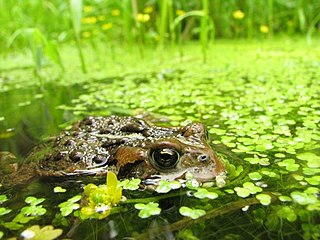
Ecology is the natural science of the relationships among living organisms and their environment. Ecology considers organisms at the individual, population, community, ecosystem, and biosphere levels. Ecology overlaps with the closely related sciences of biogeography, evolutionary biology, genetics, ethology, and natural history.

A biogeochemical cycle, or more generally a cycle of matter, is the movement and transformation of chemical elements and compounds between living organisms, the atmosphere, and the Earth's crust. Major biogeochemical cycles include the carbon cycle, the nitrogen cycle and the water cycle. In each cycle, the chemical element or molecule is transformed and cycled by living organisms and through various geological forms and reservoirs, including the atmosphere, the soil and the oceans. It can be thought of as the pathway by which a chemical substance cycles the biotic compartment and the abiotic compartments of Earth. The biotic compartment is the biosphere and the abiotic compartments are the atmosphere, lithosphere and hydrosphere.

Biogeochemistry is the scientific discipline that involves the study of the chemical, physical, geological, and biological processes and reactions that govern the composition of the natural environment. In particular, biogeochemistry is the study of biogeochemical cycles, the cycles of chemical elements such as carbon and nitrogen, and their interactions with and incorporation into living things transported through earth scale biological systems in space and time. The field focuses on chemical cycles which are either driven by or influence biological activity. Particular emphasis is placed on the study of carbon, nitrogen, oxygen, sulfur, iron, and phosphorus cycles. Biogeochemistry is a systems science closely related to systems ecology.
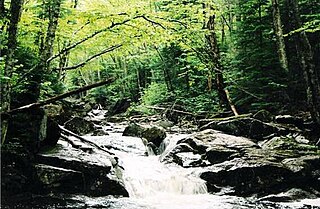
Ecosystem ecology is the integrated study of living (biotic) and non-living (abiotic) components of ecosystems and their interactions within an ecosystem framework. This science examines how ecosystems work and relates this to their components such as chemicals, bedrock, soil, plants, and animals.
The following outline is provided as an overview of and topical guide to ecology:
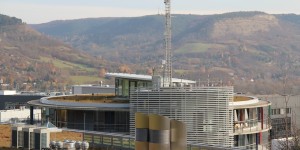
The Max Planck Institute for Biogeochemistry is located in Jena, Germany. It was created in 1997, and moved into new buildings 2002. It is one of 86 institutes in the Max Planck Society.
IBIS-2 is the version 2 of the land-surface model Integrated Biosphere Simulator (IBIS), which includes several major improvements and additions to the prototype model developed by Foley et al. [1996]. IBIS was designed to explicitly link land surface and hydrological processes, terrestrial biogeochemical cycles, and vegetation dynamics within a single physically consistent framework
The Lancaster Environment Centre (LEC) in Lancaster, England, is an interdisciplinary centre for teaching, research and collaboration at Lancaster University, founded in 2007.
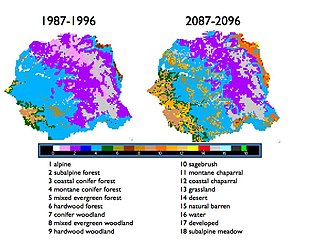
A Dynamic Global Vegetation Model (DGVM) is a computer program that simulates shifts in potential vegetation and its associated biogeochemical and hydrological cycles as a response to shifts in climate. DGVMs use time series of climate data and, given constraints of latitude, topography, and soil characteristics, simulate monthly or daily dynamics of ecosystem processes. DGVMs are used most often to simulate the effects of future climate change on natural vegetation and its carbon and water cycles.
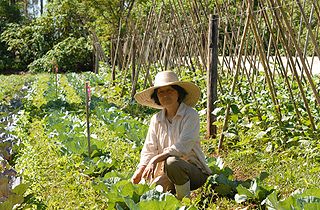
A nutrient cycle is the movement and exchange of inorganic and organic matter back into the production of matter. Energy flow is a unidirectional and noncyclic pathway, whereas the movement of mineral nutrients is cyclic. Mineral cycles include the carbon cycle, sulfur cycle, nitrogen cycle, water cycle, phosphorus cycle, oxygen cycle, among others that continually recycle along with other mineral nutrients into productive ecological nutrition.
The Grantham Institute – Climate Change and Environment is one of five global institutes at Imperial College London and one of three Grantham-sponsored centres in the UK. The institute was founded in 2007 with a £12m donation from the Grantham Foundation for the Protection of the Environment, an organisation set up by Hannelore and Jeremy Grantham.
Plant functional types (PFTs) refers to a grouping or classification system often used by ecologists and climatologists to classify plant species based on their similar functions and performances in an ecosystem. It is a way to simplify the complexity of plant diversity and behaviour in ecological models by grouping plants into categories that share common functional characteristics. This simplification helps researchers model vegetation dynamics which can be used in land use studies and climate models.
Malcolm Colin Press is a British ecologist, professor and Vice-Chancellor of Manchester Metropolitan University (MMU), in the United Kingdom.

David John Beerling FLSW is the Director of the Leverhulme Centre for Climate change mitigation and Sorby Professor of Natural Sciences in the Department of Animal and Plant Sciences (APS) at the University of Sheffield, UK. He is also Editor-in-Chief of the Royal Society journal Biology Letters.
Suzanne Mary Prober is an Australian botanist and ecologist.

Yadvinder Singh Malhi is professor of Ecosystem Science at the University of Oxford and a Jackson Senior Research Fellow at Oriel College, Oxford.

Pete Smith is a Scottish climate change scientist who is Professor of Soils and Global change at the University of Aberdeen where he directs the Scottish Climate Change Centre of Expertise, ClimateXChange.

Sandra Myrna DíazForMemRS is an Argentine ecologist and professor of ecology at the National University of Córdoba, who has been awarded with the Linnean Medal for her scientific work. She studies the functional traits of plants and investigates how plants impact the ecosystem.
Jeannine Cavender-Bares is Professor of Organismic and Evolutionary Biology at Harvard University and Director of the Harvard University Herbaria. She is also adjunct professor in the Department of Ecology, Evolution & Behavior at the University of Minnesota, where she served on the faculty for over two decades. Her research integrates evolutionary biology, ecology, and physiology by studying the functional traits of plants, with a particular focus on oaks.
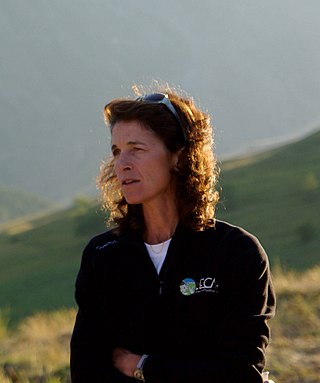
Sandra Lavorel is a French ecologist specializing in functional ecology. She is a research director at the French National Centre for Scientific Research (CNRS) where she works at the Alpine Ecology Laboratory in Grenoble, France. She has been a member of the French Academy of sciences since 2013 In 2020, she was honoured to be an international member of the National Academy of Sciences. In 2023, she was the recipient of the CNRS Gold Medal.












